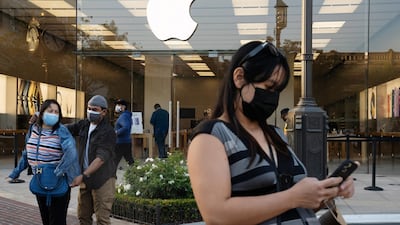Tech company Apple blocked potentially fraudulent transactions worth more than $1.5 billion on its App Store last year, the company said.
The iPhone manufacturer prevented the theft of money, confidential data and users’ time and kept nearly 1 million “risky and vulnerable” new apps away from customers.
“Threats have been present since the first day the App Store launched on iPhone and they have increased in both scale and sophistication in the years since,” Apple said.
“It takes significant resources behind the scenes to ensure these bad actors can’t exploit users’ most sensitive information, from location to payment details,” it added.
The use of apps surged in popularity amid the coronavirus-related travel restrictions as users turned online to work, study and be entertained.
Launched in 2008, the App Store is home to more than 1.8 million apps and is visited by over half a billion people each week across 175 countries. Sales worth $519bn were facilitated through the platform in 2019, consulting firm Analysis Group revealed in a June study supported by Apple.
Last year, the company said more than 180,000 new developers launched their apps on its platform, which had 1.5 billion active devices, compared to 1.4 billion in 2019.
But with increased usage of apps, security threats have also grown.
Apple's app review team rejected more than 48,000 apps for containing hidden or undocumented features and more than 150,000 apps were banned after they were found to be spam or to mislead in ways such as manipulating users into making a purchase.
The iPhone maker prevented more than 3 million stolen cards from being used to purchase goods and services and banned nearly 1 million accounts from transacting again.
To counter such threats, the company is offering secure payment technologies like Apple Pay and StoreKit, which are used by more than 900,000 apps to sell goods and services on the App Store.
Some developers also followed a bait-and-switch approach in an attempt to deceive the company, fundamentally changing how the app works after review to “evade guidelines and commit forbidden and even criminal actions”.
Last year, about 95,000 apps were removed from the App Store for fraudulent violations, mainly for bait-and-switch behaviour, Apple said.
“Apple has rejected or removed apps that switched functionality after initial review to become real-money gambling apps, predatory loan issuers … used in-game signals to facilitate drug purchasing and rewarded users for broadcasting illicit content through video chat,” Apple said.
The company deactivated 244 million customer accounts due to fraudulent and abusive activity. In addition, 424 million attempted account creations were rejected because they displayed patterns consistent with fraudulent activity.
One of the common reasons why apps are rejected is because developers ask for more user data than they need or they intend to mishandle the data they collect, according to Apple. In 2020, it rejected over 215,000 apps for these privacy violations.
“Even with these stringent review safeguards in place, problems still surface,” the company said.
Users can report problematic apps by choosing the Report a Problem feature on the App Store or calling Apple Support.
The specs: 2018 Nissan 370Z Nismo
The specs: 2018 Nissan 370Z Nismo
Price, base / as tested: Dh182,178
Engine: 3.7-litre V6
Power: 350hp @ 7,400rpm
Torque: 374Nm @ 5,200rpm
Transmission: Seven-speed automatic
Fuel consumption, combined: 10.5L / 100km
Company%20Profile
%3Cp%3E%3Cstrong%3ECompany%20name%3A%20%3C%2Fstrong%3ENamara%0D%3Cbr%3E%3Cstrong%3EStarted%3A%20%3C%2Fstrong%3EJune%202022%0D%3Cbr%3E%3Cstrong%3EFounder%3A%20%3C%2Fstrong%3EMohammed%20Alnamara%0D%3Cbr%3E%3Cstrong%3EBased%3A%20%3C%2Fstrong%3EDubai%20%0D%3Cbr%3E%3Cstrong%3ESector%3A%20%3C%2Fstrong%3EMicrofinance%0D%3Cbr%3E%3Cstrong%3ECurrent%20number%20of%20staff%3A%20%3C%2Fstrong%3E16%0D%3Cbr%3E%3Cstrong%3EInvestment%20stage%3A%20%3C%2Fstrong%3ESeries%20A%0D%3Cbr%3E%3Cstrong%3EInvestors%3A%20%3C%2Fstrong%3EFamily%20offices%0D%3Cbr%3E%3C%2Fp%3E%0A
COMPANY PROFILE
Initial investment: Undisclosed
Investment stage: Series A
Investors: Core42
Current number of staff: 47
Young women have more “financial grit”, but fall behind on investing
In an October survey of young adults aged 16 to 25, Charles Schwab found young women are more driven to reach financial independence than young men (67 per cent versus. 58 per cent). They are more likely to take on extra work to make ends meet and see more value than men in creating a plan to achieve their financial goals. Yet, despite all these good ‘first’ measures, they are investing and saving less than young men – falling early into the financial gender gap.
While the women surveyed report spending 36 per cent less than men, they have far less savings than men ($1,267 versus $2,000) – a nearly 60 per cent difference.
In addition, twice as many young men as women say they would invest spare cash, and almost twice as many young men as women report having investment accounts (though most young adults do not invest at all).
“Despite their good intentions, young women start to fall behind their male counterparts in savings and investing early on in life,” said Carrie Schwab-Pomerantz, senior vice president, Charles Schwab. “They start off showing a strong financial planning mindset, but there is still room for further education when it comes to managing their day-to-day finances.”
Ms Schwab-Pomerantz says parents should be conveying the same messages to boys and girls about money, but should tailor those conversations based on the individual and gender.
"Our study shows that while boys are spending more than girls, they also are saving more. Have open and honest conversations with your daughters about the wage and savings gap," she said. "Teach kids about the importance of investing – especially girls, who as we see in this study, aren’t investing as much. Part of being financially prepared is learning to make the most of your money, and that means investing early and consistently."
Mercer, the investment consulting arm of US services company Marsh & McLennan, expects its wealth division to at least double its assets under management (AUM) in the Middle East as wealth in the region continues to grow despite economic headwinds, a company official said.
Mercer Wealth, which globally has $160 billion in AUM, plans to boost its AUM in the region to $2-$3bn in the next 2-3 years from the present $1bn, said Yasir AbuShaban, a Dubai-based principal with Mercer Wealth.
“Within the next two to three years, we are looking at reaching $2 to $3 billion as a conservative estimate and we do see an opportunity to do so,” said Mr AbuShaban.
Mercer does not directly make investments, but allocates clients’ money they have discretion to, to professional asset managers. They also provide advice to clients.
“We have buying power. We can negotiate on their (client’s) behalf with asset managers to provide them lower fees than they otherwise would have to get on their own,” he added.
Mercer Wealth’s clients include sovereign wealth funds, family offices, and insurance companies among others.
From its office in Dubai, Mercer also looks after Africa, India and Turkey, where they also see opportunity for growth.
Wealth creation in Middle East and Africa (MEA) grew 8.5 per cent to $8.1 trillion last year from $7.5tn in 2015, higher than last year’s global average of 6 per cent and the second-highest growth in a region after Asia-Pacific which grew 9.9 per cent, according to consultancy Boston Consulting Group (BCG). In the region, where wealth grew just 1.9 per cent in 2015 compared with 2014, a pickup in oil prices has helped in wealth generation.
BCG is forecasting MEA wealth will rise to $12tn by 2021, growing at an annual average of 8 per cent.
Drivers of wealth generation in the region will be split evenly between new wealth creation and growth of performance of existing assets, according to BCG.
Another general trend in the region is clients’ looking for a comprehensive approach to investing, according to Mr AbuShaban.
“Institutional investors or some of the families are seeing a slowdown in the available capital they have to invest and in that sense they are looking at optimizing the way they manage their portfolios and making sure they are not investing haphazardly and different parts of their investment are working together,” said Mr AbuShaban.
Some clients also have a higher appetite for risk, given the low interest-rate environment that does not provide enough yield for some institutional investors. These clients are keen to invest in illiquid assets, such as private equity and infrastructure.
“What we have seen is a desire for higher returns in what has been a low-return environment specifically in various fixed income or bonds,” he said.
“In this environment, we have seen a de facto increase in the risk that clients are taking in things like illiquid investments, private equity investments, infrastructure and private debt, those kind of investments were higher illiquidity results in incrementally higher returns.”
The Abu Dhabi Investment Authority, one of the largest sovereign wealth funds, said in its 2016 report that has gradually increased its exposure in direct private equity and private credit transactions, mainly in Asian markets and especially in China and India. The authority’s private equity department focused on structured equities owing to “their defensive characteristics.”
The specs: 2017 Dodge Viper SRT
Price, base / as tested Dh460,000
Engine 8.4L V10
Transmission Six-speed manual
Power 645hp @ 6,200rpm
Torque 813Nm @ 5,000rpm
Fuel economy, combined 16.8L / 100km
Match info
Manchester United 1 (Van de Beek 80') Crystal Palace 3 (Townsend 7', Zaha pen 74' & 85')
Man of the match Wilfried Zaha (Crystal Palace)
TYPES%20OF%20ONLINE%20GIG%20WORK
%3Cp%3E%3Cstrong%3EDesign%2C%20multimedia%20and%20creative%20work%3A%20%3C%2Fstrong%3ELogo%20design%2C%20website%20design%2C%20visualisations%3C%2Fp%3E%0A%3Cp%3E%3Cstrong%3EBusiness%20and%20professional%20management%3A%20%3C%2Fstrong%3ELegal%20or%20management%20consulting%2C%20architecture%3C%2Fp%3E%0A%3Cp%3E%3Cstrong%3EBusiness%20and%20professional%20support%3A%20%3C%2Fstrong%3EResearch%20support%2C%20proofreading%2C%20bookkeeping%3C%2Fp%3E%0A%3Cp%3E%3Cstrong%3ESales%20and%20marketing%20support%3A%20%3C%2Fstrong%3ESearch%20engine%20optimisation%2C%20social%20media%20marketing%3C%2Fp%3E%0A%3Cp%3E%3Cstrong%3EData%20entry%2C%20administrative%2C%20and%20clerical%3A%20%3C%2Fstrong%3EData%20entry%20tasks%2C%20virtual%20assistants%3C%2Fp%3E%0A%3Cp%3E%3Cstrong%3EIT%2C%20software%20development%20and%20tech%3A%20%3C%2Fstrong%3EData%20analyst%2C%20back-end%20or%20front-end%20developers%3C%2Fp%3E%0A%3Cp%3E%3Cstrong%3EWriting%20and%20translation%3A%20%3C%2Fstrong%3EContent%20writing%2C%20ghost%20writing%2C%20translation%3C%2Fp%3E%0A%3Cp%3E%3Cstrong%3EOnline%20microtasks%3A%20%3C%2Fstrong%3EImage%20tagging%2C%20surveys%3C%2Fp%3E%0A%3Cp%3E%3Cem%3ESource%3A%20World%20Bank%3C%2Fem%3E%3C%2Fp%3E%0A
The Perfect Couple
Starring: Nicole Kidman, Liev Schreiber, Jack Reynor
Creator: Jenna Lamia
Rating: 3/5
F1 The Movie
Starring: Brad Pitt, Damson Idris, Kerry Condon, Javier Bardem
Director: Joseph Kosinski
Rating: 4/5
The smuggler
Eldarir had arrived at JFK in January 2020 with three suitcases, containing goods he valued at $300, when he was directed to a search area.
Officers found 41 gold artefacts among the bags, including amulets from a funerary set which prepared the deceased for the afterlife.
Also found was a cartouche of a Ptolemaic king on a relief that was originally part of a royal building or temple.
The largest single group of items found in Eldarir’s cases were 400 shabtis, or figurines.
Khouli conviction
Khouli smuggled items into the US by making false declarations to customs about the country of origin and value of the items.
According to Immigration and Customs Enforcement, he provided “false provenances which stated that [two] Egyptian antiquities were part of a collection assembled by Khouli's father in Israel in the 1960s” when in fact “Khouli acquired the Egyptian antiquities from other dealers”.
He was sentenced to one year of probation, six months of home confinement and 200 hours of community service in 2012 after admitting buying and smuggling Egyptian antiquities, including coffins, funerary boats and limestone figures.
For sale
A number of other items said to come from the collection of Ezeldeen Taha Eldarir are currently or recently for sale.
Their provenance is described in near identical terms as the British Museum shabti: bought from Salahaddin Sirmali, "authenticated and appraised" by Hossen Rashed, then imported to the US in 1948.
- An Egyptian Mummy mask dating from 700BC-30BC, is on offer for £11,807 ($15,275) online by a seller in Mexico
- A coffin lid dating back to 664BC-332BC was offered for sale by a Colorado-based art dealer, with a starting price of $65,000
- A shabti that was on sale through a Chicago-based coin dealer, dating from 1567BC-1085BC, is up for $1,950



